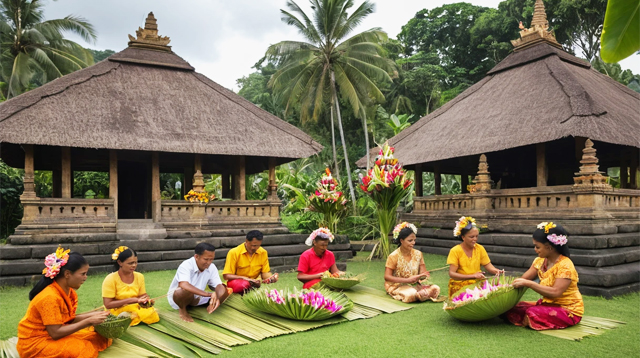THE ISLAND of Bali, often dubbed the “Island of the Gods,” is more than just stunning scenery, vibrant ceremonies, and pristine beaches. Beneath its captivating surface lies a deep thread of ancient philosophy and customs that not only shape the daily lives of its people but also define the essence of Balinese culture.
These guiding principles, deeply rooted in Hinduism, foster a unique way of life characterized by harmony, respect, and an unwavering connection with God.
Tri Hita Karana: The Three Causes of Well-Being
Perhaps the most fundamental philosophy in Bali is Tri Hita Karana. This elegant concept, meaning “three causes of happiness,” emphasizes the crucial balance that must be maintained between three interconnected realms:
- Parhyangan (harmony with God): This aspect underscores the importance of spiritual devotion and reverence for God. Balinese people express this through elaborate temple ceremonies, offerings (canang sari), and daily prayers, recognizing God as the ultimate source of life and well-being.
- Pawongan (harmony with others): This refers to the importance of fostering harmonious relationships within society. This is manifested in strong family ties, mutual respect among neighbors, and a collective spirit within village life, often seen in practices such as gotong royong (mutual cooperation).
- Palemahan (harmony with nature): This principle highlights the sacred relationship between humans and their natural environment. The Balinese people’s respect for nature is evident in their sustainable agricultural practices, the preservation of sacred trees and springs, and the belief that the land itself is imbued with spiritual power.
Maintaining a balance between these three elements is believed to bring peace, well-being, and spiritual fulfillment to individuals and society as a whole.
Law of Karma: The Law of Cause and Effect
The concept of the Law of Karma is a cornerstone of Balinese spiritual understanding. Simply put, it is the (natural) law of cause and effect, where every action, thought, and word, good or bad, inevitably produces a corresponding consequence. This belief encourages individuals to act with integrity, compassion, and mindfulness, recognizing that their present actions will shape their future.
This belief instills a sense of personal responsibility and encourages the pursuit of virtuous behavior, as good karma is believed to lead to better reincarnations and a happier life.
Tat Twam Asi: You Are That
Tat Twam Asi is a powerful Sanskrit phrase meaning “You are that” or “I am You and You are I.” This profound philosophical statement embodies the principle of universal interconnectedness. It teaches that the divine essence residing within each individual is the same divine essence permeating all beings and the entire universe.
This understanding fosters empathy, compassion, tolerance, and a deep sense of unity among people, as it reminds them that by harming others, they are essentially harming a part of themselves. This teaching encourages selfless service and a recognition of the divinity inherent in every person.
Yadnya Sesa: Daily Offerings and Gratitude
Yadnya Sesa, or “daily offerings,” are a tangible manifestation of Balinese gratitude and reverence. These small offerings of daily cooked food are placed in various locations around the home, the family temple, and even public spaces. While seemingly simple, Yadnya Sesa is a profound act of giving back to the universe and acknowledging the blessings received.
It is a humble expression of gratitude to God, ancestors, and even to the spirits and unseen elements, or sharing with all of God’s creatures that sustain life. This daily ritual reinforces the principles of humility, gratitude, and a constant awareness of the sacredness of everyday life.
There are also common expressions in Balinese as follows which support their harmony within the internal community and outsiders.
Salunglung Sabayantaka: United in Harmony
The adage Salunglung Sabayantaka means “united in harmony” or “together in joy and sorrow.” This principle emphasizes the importance of community solidarity and mutual support. This principle is deeply embedded in Balinese social order, where collective well-being often takes precedence over individual desires.
From communal celebrations at temples to helping others in times of need, Salunglung Sabayantaka fosters a strong sense of belonging and ensures that no one is left to face challenges alone. This highlights the power that comes from collective action and shared responsibility such as through gotong royong or mutual assistance.
Belahan Pane Belahan Paso
Belahan Pane Belahan Paso, Ada Kene Ado Keto. Literally, in Balinese it means “pottery shards, they are like this and that.’ Basically, it means understanding and being tolerant of differences in various things, such as ethnicity, religion, race or even in character and opinion. (*)










